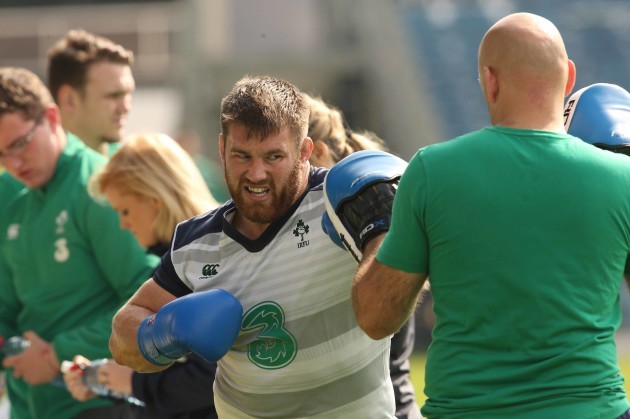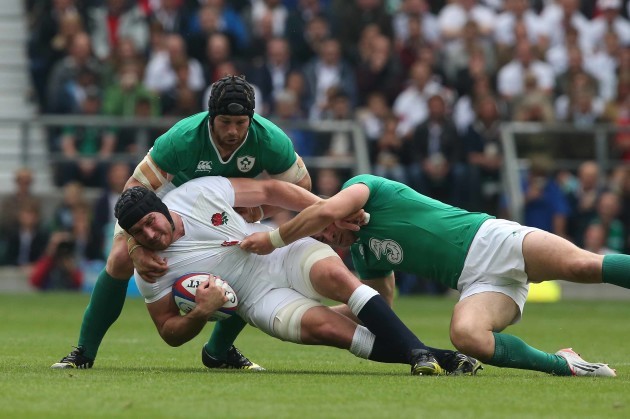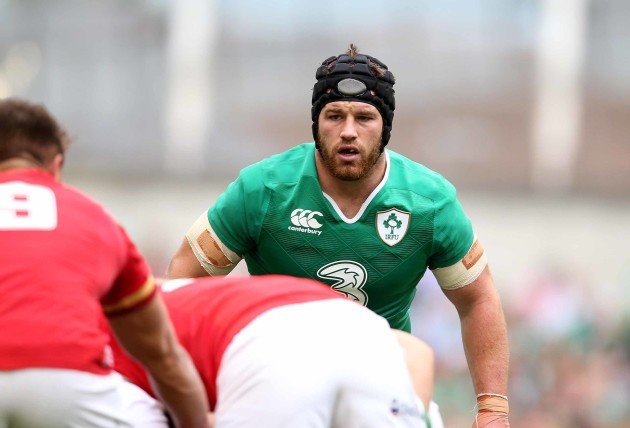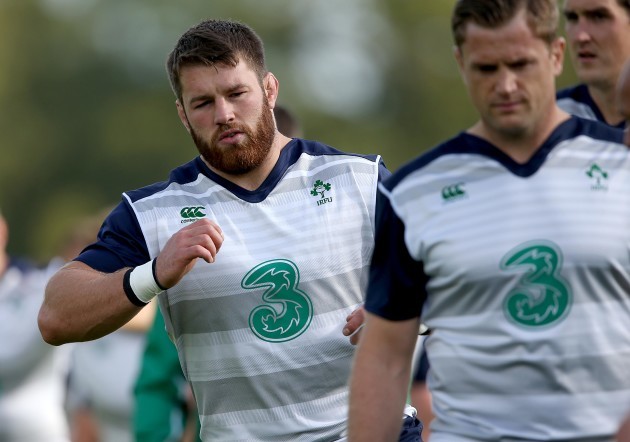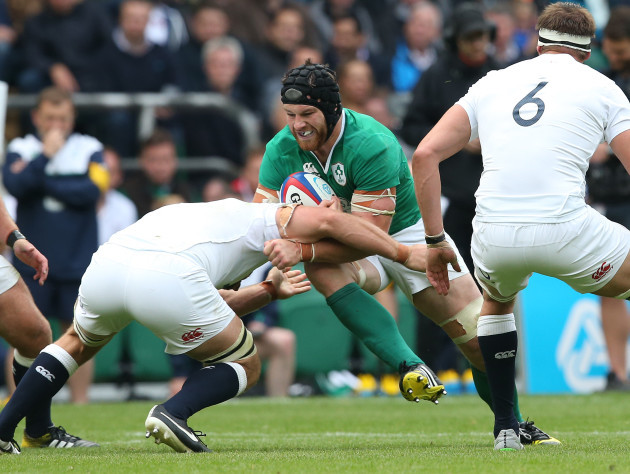THERE’S AN IMAGE of Sean O’Brien during the Scotland World Cup warm-up game that has stuck in the mind.
Jack Conan is assisting with a tackle on Fraser Brown in midfield, clearly hoping to release and then target the ball for a turnover, but O’Brien has spotted the opportunity too.
The Tullow man almost pushes his young Leinster teammate out of the way to jackal over the ball, drawing the penalty. Even after the whistle goes, O’Brien yanks the ball from Brown’s grasp and darts the two metres to referee Pascal Gaüzère, terrier-like.
He places the ball at the Frenchman’s feet, gives him a quick glance and then looks down at the ball again, as if indicating that he’s ready for the next throw, as if this is very much a fun game for him.
O’Brien had three more turnovers in that game, and is hungry for many, many more over the coming weeks at the World Cup. Always a formidable ball carrier and strong hitter, it’s the area of O’Brien’s openside play that has seen the most growth in recent years.
“It’s a massive part of the game now,” says O’Brien of his improvement. “I haven’t targeted that specific thing, but it’s probably making better decisions going to the ruck, making better decisions at the ruck in terms of what’s smart and what’s not.
‘Should I be going in for that ball, am I wasted or is it a clear and obvious opportunity to have a little dart?’ I think I’ve gotten a lot better at that over the past two or three years. It’s something I’ve been more conscious of.
“I thought before I was maybe getting a little bit beat up at the ruck, when it might have been a lost cause or even a 50/50. Whereas now I’m going in with a 70 or 80% chance of actually staying on the ball.”
That selectiveness around the breakdown is key for any good back row player and O’Brien has learned to better read the prompts and signals around him that indicate a high chance of success.
“The cues are a good chop tackle around the knee and in my area,” says O’Brien. “Myself, if I get a one-on-one and I know he doesn’t have good support there, I try get him to the ground as quickly as I can and then reload to try and get over the ball or barge through it (drive past the ball to leave space behind for his teammates to claim possession).
“It’s a few small, subtle things like that that give you the cue.”
The modern-day turnover has almost morphed into a two-man job.
Poachers were always reliant on their teammates to make effective tackles in order to open opportunities, but now we so often see the main jackal being supported by a player latching onto them.
‘Clamping’ or ‘anchoring’ is sometimes as important as the jackal itself, in allowing the poacher to stay on his feet or ride the rucking efforts of the attacking team. O’Brien, however, has a preference for flying solo when it comes to turnovers.
“That happens every now and again, although it’s not something we train for really,” says O’Brien. “You just find yourself in those situations, see someone in a strong position, you just clamp onto his side and make sure you’re not knocking him off his feet.
The thing about a poacher is that you have to let him do his own work. You don’t want to be nudging him or holding onto him too much, because he feels the impact from the opposition and reacts by maybe getting his feet wider, or he’s able to accept that hit.
“If you’re latched onto him, on his bum for example with a shoulder on him, and he gets hit it might actually fling him to one side because he doesn’t have that spring to come back at the ball. I prefer people just leaving me alone and letting me work the ruck.”
The Carlow native might like having his own space and can handle himself for sure, but there’s always another key player in the breakdown battle: the referee.
The match officials will have as big a say in the World Cup as anyone and O’Brien has certainly found himself on the wrong side of this particular coin at times in the recent past.
Glen Jackson of New Zealand will referee Ireland’s opening game against Canada on Saturday, and we can be certain that Joe Schmidt has led his team through an analysis of the Kiwi’s usual traits and focus areas.
“All referees are very hot on hands on the ground now, initially,” says O’Brien, referencing an action for which many critics have felt Ireland have been given too much leeway in recent seasons.
“If your hands go down on the ground initially, you’ll almost definitely get pinged. If you go on the ball and you’re hanging on for a second or two and one hand goes down after that, it’s a call he (the referee) has to make.
“If he can see a positive picture of you latched onto the ball and hanging in there, it’s an easy decision for him then, rather than throwing your hands down, waiting to be hit and then grabbing the ball.
“That’s kind of going out of the game and we’re trying to take those 50/50 calls from the referees out of the equation by actually going hard at the ball when the opportunity arises.”
O’Brien’s ruck duties are obviously not limited to defence, and the memory of his huge clearout against France during this year’s Six Nations remains strong.
The 28-year-old stresses the need for consistency in clearing bodies as he laughs at how the video of that act turned into a viral sensation.
“You have to be there early and you have to target someone,” says O’Brien, before underling that without quick ball Ireland, and any team, will struggle at the World Cup. Schmidt’s demands in this department haven’t faded, O’Brien assures us.
While O’Brien still loves getting his hands on the ball to carry, he has learned to be more patient in waiting for an opportunity to set himself into bulldozing mode. He will hope for ideal carrying chances in the coming weeks, but won’t sacrifice the collective for any individual gains.
“I’d love to get my hands on the ball more often in wide channels, running against backs and that type of thing,” says O’Brien. “That will happen at different stages in any given game. Sometimes a game will mean more breakdown work, it depends on the day.”
Ireland forwards under Schmidt haven’t been asked to pass the ball a huge amount, instead focusing on making strong carries and contributing to a clinical and efficient ruck speed post-tackle.
There were, however, hints in the warm-up games before the World Cup of new creases in the Ireland game plan that allow men like Peter O’Mahony and, potentially, O’Brien to release the ball rather than carrying every single time.
“Probably in previous years, we haven’t had that aspect in our game plan as such,” says O’Brien. “It’s an option for us now obviously. Loose forwards should be well able to play with the ball in our hands, whether it’s a plus pass or simple quick hands, we should be able to do that.
“As a group we should be able to do that. If you look at all the players in our squad, they’re very comfortable with the ball in hand, so that’s where you need to get to.”
So if there’s to be a little more passing, does that also mean there might be more offloading? Ireland haven’t been eager to get the ball away in the tackle during Schmidt’s tenure, but O’Brien says it has never been banned.
It’s not something that we’re too hung up over, getting offloads away. But if it’s on, it’s there for us. You’re not going to be shot for throwing an offload as long as the risk element is not there.
“If you throw a 50/50 it’s different to throwing an offload, there’s an element of risk there. If you’re through a gap, through a hole and someone is running off you, yeah, fire it to him.
“We have the license to go out and play when we do get in behind teams, so we should have that in our armoury at all stages.”
One to follow closely, although O’Brien’s words indicate that there won’t be any major philosophy shift from Ireland. Certain things have brought Ireland success up to this point, and dramatically changing the process would be dangerous.
The same applies for O’Brien as an individual; he will look to keep growing the skills he has been growing since the last World Cup. The impression is of a man reading the game better than ever, but O’Brien says that perception comes simply because he’s putting in more prep work than ever.
“That’s knowing your role throughout,” says O’Brien. “You do your study during the week and it happens for you then during the game. Your only thought process in the game is ‘Where am I off to next?’
“You know where you’re off to and focusing on that specific next job. If it’s a wide ruck, you’re hitting that ruck. If it’s not, you might be coming around the corner. You’re moving, but thinking about the next thing to do.
It’s all planned out during the week so it looks like it comes more naturally to you.”
Such is life under Schmidt. O’Brien is enjoying it more than ever, suggesting that the Kiwi head coach is perhaps sometimes underrated as a man manager, with his tactical acumen instead drawing the plaudits.
“Joe has had a big influence on me,” says O’Brien. “I’ve worked with him now for six years so I know him inside out. I have a good relationship with him. You know what his demands are and his standards are.
“You don’t want to let him down, as well as yourself. As long as your standards are high and you’re working hard for the rest of the set-up, there are no issues.”
Schmidt has had a telling influence on O’Brien, but there is one person above all who has ensured the openside has grown into the player he is.
“I have the main influence, because I’d be critical of myself in wanting to become one of the best.”
